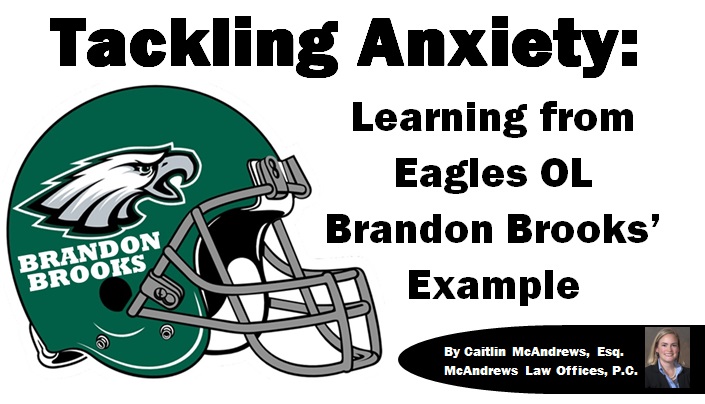“Tackling Anxiety: Learning from Eagles OL Brandon Brooks’ Example” By Caitlin McAndrews, Esq., McAndrews Law Offices, P.C.
Eagles offensive lineman Brandon Brooks recently opened up to fans and the media about his struggles with anxiety, which he says manifests itself in severe stomach illness and vomiting. Many football watchers may be surprised that someone who has played so successfully in the NFL for five years has struggled inwardly and behind the scenes. Others may not understand how a mental health diagnosis like anxiety can create such striking physical symptoms – even Brooks himself thought he had ulcers up until very recently. But to parents of children with school-based anxiety, this situation is all too common, albeit with less press coverage and sometimes with a lot less public support.
Many children who struggle with school-based anxiety manage to “keep it together” during the school day, only to fall apart at home. Getting out of bed and out the door every day may be an intense daily battle. For some children, as with Brooks, the anxiety manifests itself in physical symptoms, and children and parents themselves may not realize that anxiety is the true culprit. In these cases, the children may also frequently miss school due to the physical symptoms they are experiencing, and parents and school staff may not recognize the psychological factors underlying the child’s absences.
In these situations, communication with the school can be key to getting your child the help he or she needs. For the child who can function throughout the school day but is wracked with anxiety at home, the school needs to be made aware of the problem before they can do anything. Parents should explain these issues to the school (in writing), and, if the school does not offer to do so themselves, parents should send the school a written request for an evaluation of their child. Likewise, if a family learns later that a child’s physical illness was a psychosomatic symptom of a mental health diagnosis like anxiety, this information needs to be communicated to the school to put them on notice of the potential need for school-based supports for the child.
A good evaluation of a child whose anxiety interferes with school attendance should include a functional behavioral assessment (FBA) that assesses the child before he or she even arrives at school. Many school districts will push back on conducting such assessments, arguing that they can only test kids in school, but the data is often crucial to enabling a child to return to school. As a result, parents should know when it may be time to consult outside help in securing needed testing for children struggling with school-based anxiety.
Brandon Brooks should be applauded for taking affirmative steps to address his anxiety and for not shying away from talking about it. Mental illness continues to be stigmatized, but as more people like Brooks speak publically and comfortably about it, the stigma begins to fall away, and hopefully more people will get the treatment and support they need. Brooks says he hopes other kids will be inspired by his fight, noting “I’ll be fine. I’ll come out better from this, a better person.”

